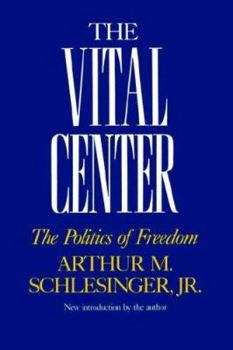The Vital Center: The Politics of Freedom
Select Format
Select Condition 
Book Overview
The Vital Center is an eloquent and incisive defense of liberal democracy against its rivals to the left and to the right, communism and fascism. Originally published in 1949, it shows how the... This description may be from another edition of this product.
Format:Hardcover
Language:English
ISBN:0306803232
ISBN13:9780306803239
Release Date:March 1988
Publisher:Da Capo Press
Length:274 Pages
Weight:0.72 lbs.
Dimensions:0.7" x 6.0" x 9.1"
Customer Reviews
4 ratings
Interesting even if you are not a "liberal"
Published by Thriftbooks.com User , 15 years ago
As a libertarian-leaning fellow, it is often difficult to find main stream literature aimed squarely at me. Though Schlesinger is a well known liberal I nonetheless found many interesting points in this book that were worth further consideration. The chief impression that it left on me, reflected on now a year or so since I read it, is the need for a "centrism" in our politics. Schlesinger's recipe for achieving that centrism may be different than my own, but I cannot help but agree that our ends would be the same in this point.
How the Democrats searched for the political center in the Cold War
Published by Thriftbooks.com User , 17 years ago
Read this for graduate American history course. Schlesinger's book, "The Vital Center is habitually cited as a turning point for American liberalism, an unequivocal rejection of extremist politics and an articulation of a new liberal anticommunist political realism." Schlesinger's opening premise was that the industrial revolution put mankind in a state of fear and anxiety, and thus made mankind more apt to turn to utopian and totalitarian forms of government to assuage their fears. Only in the aftermath of the terrible events of WWII were liberals forced to recognize that humankind indeed had the capacity to do evil. This recognition made liberals give up their long held belief in humankind's perfectibility and rationality. Schlesinger realized that the history of appeasing Hitler prior to the war, and the dangers that loomed in making the same mistake with Stalin in the days ahead, made it important to construct a liberal response to Communism that could stand up to the criticism of the political right in America. He wanted to prove that a new liberal doctrine would in fact occupy the vital center in American politics. He attacked the conservatives for their unwillingness to tackle social reforms during the industrial revolution, and he saw insipid conservative capitalists meeting their responsibilities by hiding behind destructive tariffs and monopolies. Schlesinger observed that historically, conservatives turned their backs on robust men, such as Theodore Roosevelt and Winston Churchill; men who acted masculinely. Instead, conservatives embraced the effeminate Neville Chamberlains of the world, men who traded responsibility for isolationism. Thus, Schlesinger charged conservatives of becoming "impotent" men politically. On the other hand, Schlesinger ridiculed the progressive left, which he named "Doughfaces," because they were too pliable and "hopelessly and irrevocably feminine." Doughfaces live within utopian beliefs and do not recognize the harsh realities of the world. For Schlesinger, Doughfaces had a genuine concern for the betterment of humankind but could only muster up enough energy to be dreamers and critics; they were not masculine enough to be doers. Thus, "Schlesinger took the progressive's politics as evidence of emotional maladjustment, what the postwar intelligentsia so frequently and indiscriminately called `neurosis'." Schlesinger's conclusion was that the reconstituted postwar liberal leaders would occupy the vital center politically by proving that they were doers and not just complainers. Schlesinger argued that these new leaders were the only people capable of producing "a secure and restored American masculinity." Despite Schlesinger's effort to masculinize the liberal reform tradition, did not prevent liberals (including Schlesinger himself) from being accused of softness. The hard right's political rhetoric became much cruder and targeted such men as Secretary of State Dean Acheson and presi
One of the best books on American politics of the 20th century
Published by Thriftbooks.com User , 19 years ago
This book could also be could also be titled "the Liberal Manifesto", a dead on pamplet distinguishing American "Cold War Liberalism" as a coherent political philosphy. Schlesinger fuses Niebuhr's views on human naure and power, with Keynes' economics, and his own scholarly interpetation of American history. Schelsinger makes the case for a liberalism that eschews dogma for pragmatism and a cautious embrace of power in the service of self determination and opportunity. Over 50 years after its original release the book still brims with freshness and clarity.As we become more polarized as a nation, it would do us all well, regardles of poltical stripes heed the arguments put forth in this book and renew our commitment to our Democratic institutions.
buy the Transaction Publishers version
Published by Thriftbooks.com User , 19 years ago
Lucid, articulate, eloquent. There are long passages that are as timely now as when they were originally written in the late 40's. We desperately need a contemporary leader with this voice. BUT do not buy the Da Capo paperback edition -- it is missing several pages at the end of one chapter and the beginning of the next.





